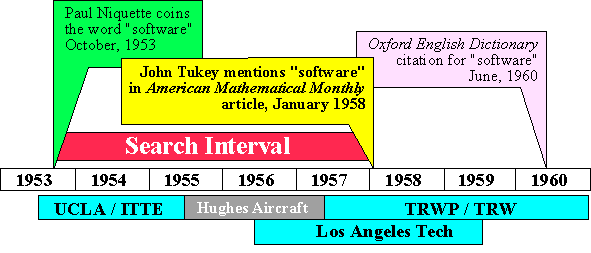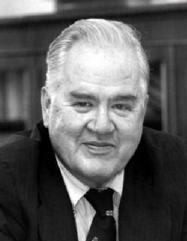But of course, I began thinking about all those inquiries I had launched, hoping to contact surviving TRW colleagues, all those phone calls to old friends, all those follow-up letters and messages. Get real, I told myself. Unless datable no later than the end of 1957, any Established Stories thus obtained would be worthless. Same for any of my LA Tech students from the fifties who might stumble onto my website and remember... Remember what? To contribute a relevant anecdote, an LA Tech student...
So much for Established Stories, the third and last search. October of 2000 marked the end of the softword project. There would be no entry in OED or any other dictionary giving me credit for coining the word 'software'. It was for such a moment that the s-word was invented. The four-letter one.
There can be little doubt that the years 2001 through 2003 will be characterized by future historians as global downers. Still, in that hiatus I found many cheerful distractions. I published the Internet versions of two books, A Certain Bicyclist and Squawk 1200, added a dozen entries in Puzzles with a Purpose, and launched yet another new career -- number eighteen since 1953, by my count. My life trajectory has been nothing but discontinuities, it seems. October 2003 came along, and I marked the 50th anniversary of the epiphany with a rueful chuckle. The softword project had been an adventure, all right -- more than an adventure, in fact. The search for Established Stories connected -- re-connected -- me to projects and people of great personal value. Never mind that the projects have been obsoleted and that so many of the people have departed. All have returned with full vitality to my mind exactly the way they were decades ago. If that is the only prize I am justified in seeking, then... Wait just a damn minute. Forget sentimentality. I have a challenger! The Challenger
Tukey's popular fame was assured by such high-profile work as projecting the election-day results of presidential contests for national television, plus...
...an amateur linguist who made significant contributions to the language of modern times. In a 1958 article in American Mathematical Monthly, he became the first person to define the programs on which electronic calculators ran...Three decades before the founding of Microsoft, Mr. Tukey saw that ''software,'' as he called it, was gaining prominence. ''Today,'' he wrote at the time, it is ''at least as important as the 'hardware' of tubes, transistors, wires, tapes and the like.''It's as if one of Tukey's achievements was expressed in what appears to be a mere off-hand mentioning of the word 'software.' That observation struck me hard and set me to wondering... Why did John Wilder Tukey go to his grave without actually claiming the invention of the word 'software' 42 years earlier?John Tukey (1915-2000) was a contemporay of my father, Reaman Niquette (1913-2002). Over a period of three years following his death, John Tukey has become an admired friend of mine. That is not meant facetiously. I am embarrassed to admit this, but while studying his life and his work, I have heard myself in simulated conversations with Tukey. "Excuse me, John, but I just don't think you got it!"The editors of OED will doubtless accept that conversation as evidence of my eccentricities more than for authentication of my claim. There is no evidence that Tukey ever declined the acclaim to which he was entitled. Nevertheless, from all I have seen, for decades after 1958, Tukey manifested total indifference to the word 'software,' arguably the most important new word of the 20th Century! Editors of any dictionary, especially the OED, would have eagerly glommed on to documentary evidence for the origin of such a far-reaching entry and would have been thrilled to publish that 1958 citation from so eminent and colorful a figure of the Twentieth Century. Moreover, it goes without saying that for his formal writing, Tukey would never have chosen to have his work published anonymously. The OED protocol, however, now casts Tukey in the role of a posthumous claimant. That makes him a challenger to my claim. Thus, after three years, I became tempted beyond my powers to resist. I set about to demystify John Wilder Tukey's reluctance.
Tukey was also a great wordsmith: he coined the terms bit, byte, software and cepstrum, (the Fourier transform of the logarithm of the Fourier transform). But some of his kookier coinages, like quefrency (for cepstral frequency) and saphe (for cepstral phase) didn't catch on.The word 'bit'? -- possibly, although Claude Shannon was first to publish, as indicated in the OED entry... 1948 C. E. Shannon in Bell Syst. Techn. Jrnl. July 380 The choice of a logarithmic base corresponds to the choice of a unit for measuring information. If the base 2 is used the resulting units may be called binary digits, or more briefly bits, a word suggested by J. W. Tukey...but probably not 'byte' according to the OED entry... 1964 Blaauw & Brooks in IBM Systems Jrnl. III. 122 An 8-bit unit of information is fundamental to most of the formats [of the System/360].By the way, as the word 'bit' caught on, some computer scientists became indignant. They saw Professor Tukey as an outsider. "Not everyone was happy that he was naming things in their field,'' said Steven M. Schultz, a spokesman for Princeton. That complaint is not justified, in my opinion. Computer scientists have been singularly uncreative in naming things, beginning with 'computer science' itself. And 'bit' is as well suited to communications as to computers anyway. Meanwhile, Tukey's neologisms within his own field ('cepstrum,' 'quefrency' and 'saphe') do not appear in the OED, but then neither do some of mine. Turning to the
now famous sentence, which appeared near the
beginning of Tukey's essay titled "The Teaching of
Concrete Mathematics" in the January 1958 American
Mathematical Monthly...
Given the formidible practicality of software to do things not just help programmers write programs to do things; given the manifold impacts of software upon all aspects of human work and achievements, of life and now even of play; given the astounding realities of software, which among all of mankind's creations is uniquely indestructible -- given all those amazements, where is the grandeur in Tukey's 1958 statement? There isn't any, only a routine declarative-in-passing.
Um...what about radios and reading lamps, vacuum cleaners and ventilating fans, washing machines and water pumps, central heating and air conditioning, garage door openers and clothes dryers, elevators and escalators, televisions and videos? Things, not just the means for making things. Readers may have noticed my deliberate practice in this work of using single quotes to set off the word 'software' from software itself. The reader is invited to notice Tukey's use of the double quote around "software" in a sentence in which software -- not the word 'software' -- was being described.If indeed this "momentous" sentence (sarcasm intended) is to be credited with bringing the word 'software' into the English language, then one might be forgiven for expecting a prefixed phrase of the form, "What I call 'software'..."
The way I see it, after decades of historical developments facilitated by software -- the worldwide emergence of what I call 'The Software Age' -- John Wilder Tukey ignored the immense implications of the word 'software' decade after decade and went to his grave knowing that he was merely using an established word. So then, who really coined the
word 'software'?
|

 There
is
no denying his eminence. Biographical sketches
and tributes abound on the Internet. John
Wilder Tukey's formal work fills volumes, shaping
statistical analysis. He has served in
prestigious posts at all the top venues, including
Princeton, Bell Telephone Labs, and performed a
number of major consulting assignments, including
Educational Testing Service, Merck & Co., and,
ironically, Xerox, where I faintly recall meeting
the man in the '70's.
There
is
no denying his eminence. Biographical sketches
and tributes abound on the Internet. John
Wilder Tukey's formal work fills volumes, shaping
statistical analysis. He has served in
prestigious posts at all the top venues, including
Princeton, Bell Telephone Labs, and performed a
number of major consulting assignments, including
Educational Testing Service, Merck & Co., and,
ironically, Xerox, where I faintly recall meeting
the man in the '70's.